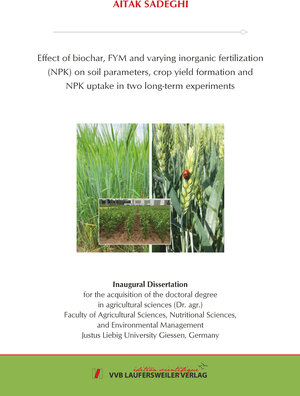Effect of biochar, FYM and varying inorganic fertilization (NPK) on soil parameters, crop yield formation and NPK uptake in two long-term experiments
von Aitak SadeghiToday's agriculture is facing the challenge of producing more food but simultaneously striving for a lower environmental impact. With the aim of enhancement of production, it is needed to keep or enhance soil fertility, which can be defined as the capacity of soil to provide suitable physical, chemical and biological conditions for the plant productivity and sustainable ecosystem integrating diverse soil functions.
Inorganic and organic fertilizers play a fundamental role in soil fertility, among all, NPK fertilizers are considered as one of the most macro nutrients needed in crop production. In contrast, organic fertilizers contain higher amounts of carbon and comparatively small amounts of plant-available nutrients which can improve the physical, chemical and biological properties of the soil. In addition, biochar, considered as of organic amendments with varying but high amounts of carbon might also improve the soil fertility during a long period of time. Long-term experiments are very important tools in monitoring, understanding and proving the changes in soil fertility happening as a result of long-term agrotechnical operations, first of all that of fertilization.
Two studies based on long-term experiments (LTEs) were carried out with the objectives to investigate the effect of long-term application of NPK and organic amendments (FYM and biochar) on soil nutrient content, soil microbial biomass and soil respiration as well as on growth and growth components and nutritional status of the studied crops. The first LTE called exhaustion experiment Giessen was investigated from 2014 to 2016 when the field was under cultivation of summer barley, sugar beet and winter wheat respectively. The experimental design was strip plot design including different dosages (50% NPK, 100% NPK and 100% NPK + FYM) and combinations of fertilization (without, PK, NP, NK and NPK) with four replications. Soil parameters (in 0‒30 cm) Ct, Nt, soil respiration and SMB C as well as crop parameters such as LAI, leaf chlorophyll (SPAD), yield and NPK uptake were measured during 3 years of the study.
The investigation revealed that the treatment of 100% NPK + FYM showed a significant higher Ct content in all three years in comparison with the treatments which were applied only by inorganic fertilization. This soil parameter was not affected by the main effect of NPK combination. The result of Nt content of the soil showed that integrated treatment of 100% NPK + FYM indicated higher value in comparison with the treatments without FYM application. Moreover, only in the last year of the study Nt was affected by different combinations of inorganic N fertilization compared to PK treatment. Soil respiration was affected by the main effect of NPK dosage/FYM and the treatment of 100% NPK + FYM led to significantly higher soil respiration compared to 50 and 100% NPK. In addition, this soil parameter was affected significantly by the main effect of NPK combination and different combinations of inorganic N fertilization resulted in higher soil respiration compared to the treatments without N fertilization. Regarding SMB C, the results revealed that in three years of investigation the values were significantly higher in integrated treatments compared to the same combinations in 50 and 100% NPK without FYM application.
The plant parameters including in vegetative stage (LAI and SPAD value) and reproductive stage (yield and NPK uptake) were influenced by inorganic N fertilization and FYM application when it is combined with inorganic fertilization. As expected, increasing N dosage led to higher performance of the crops.
The biochar investigations were carried out in a field experiment Giessen in the period from 2014 to 2016 when the field was under cultivation of summer barley, maize and winter wheat respectively. The experimental design was strip plot design including different dosages of FYM comprised 0 and 30 t/ha and different dosages of biochar including 0, 15 and 30 t/ha with 4 replications.
The Ct content in the soil (0‒30 cm) increased significantly after application of biochar only in 2014 but not in 2015 and 2016 where an increasing trend was visible. In terms of Nt, the studied results showed a significant effect of FYM only in 2015. However, there was not any significant biochar effect during three years although sole application of biochar or integrated treatments of biochar and FYM showed higher performance than control. The soil respiration was not affected either by biochar or by FYM during the three years. The present findings on SMB C showed that application of FYM led to significant difference, whereas biochar treatment did not show any effects during three years of investigation.
Furthermore it was found, that biochar (30 t/ha) and FYM led to increase LAI and SPAD values of the crops. However, biochar did not have significant effect on the yield of investigated crops but it showed an increasing trend. In most cases NPK uptake by the investigated crops was not significantly affected by the application of biochar. On the other had FYM resulted in increase of NPK uptake by winter wheat.
It can be concluded that one of the most important effect of FYM application is to increase the organic matter content of soil. Higher organic matter of soil can promote activity of soil microorganisms and improve soil physico/chemical properties during long period of time particularly when it was combined with NPK fertilization. The investigated results revealed that with a long term nutrient depletion, nitrogen becomes the most limiting factor for plant growth and crop yield. In fact, this is a typical phenomenon of long term nutrient depletion experiment, since nitrogen is an essential macro nutrient that plants need in a large amount.
The effect of FYM application on crop yield can be interpreted in terms of additional nutrient application and application of large amount of organic matter (Ct/Corg) resulting in improved soil fertility. In this investigation the used biochar did not lead to a significant effect in most cases on soil and crop parameters although the trend was increasing. The current investigation was in an early phase and it remains to be seen whether clearer effect will occur after a long period of research.
Inorganic and organic fertilizers play a fundamental role in soil fertility, among all, NPK fertilizers are considered as one of the most macro nutrients needed in crop production. In contrast, organic fertilizers contain higher amounts of carbon and comparatively small amounts of plant-available nutrients which can improve the physical, chemical and biological properties of the soil. In addition, biochar, considered as of organic amendments with varying but high amounts of carbon might also improve the soil fertility during a long period of time. Long-term experiments are very important tools in monitoring, understanding and proving the changes in soil fertility happening as a result of long-term agrotechnical operations, first of all that of fertilization.
Two studies based on long-term experiments (LTEs) were carried out with the objectives to investigate the effect of long-term application of NPK and organic amendments (FYM and biochar) on soil nutrient content, soil microbial biomass and soil respiration as well as on growth and growth components and nutritional status of the studied crops. The first LTE called exhaustion experiment Giessen was investigated from 2014 to 2016 when the field was under cultivation of summer barley, sugar beet and winter wheat respectively. The experimental design was strip plot design including different dosages (50% NPK, 100% NPK and 100% NPK + FYM) and combinations of fertilization (without, PK, NP, NK and NPK) with four replications. Soil parameters (in 0‒30 cm) Ct, Nt, soil respiration and SMB C as well as crop parameters such as LAI, leaf chlorophyll (SPAD), yield and NPK uptake were measured during 3 years of the study.
The investigation revealed that the treatment of 100% NPK + FYM showed a significant higher Ct content in all three years in comparison with the treatments which were applied only by inorganic fertilization. This soil parameter was not affected by the main effect of NPK combination. The result of Nt content of the soil showed that integrated treatment of 100% NPK + FYM indicated higher value in comparison with the treatments without FYM application. Moreover, only in the last year of the study Nt was affected by different combinations of inorganic N fertilization compared to PK treatment. Soil respiration was affected by the main effect of NPK dosage/FYM and the treatment of 100% NPK + FYM led to significantly higher soil respiration compared to 50 and 100% NPK. In addition, this soil parameter was affected significantly by the main effect of NPK combination and different combinations of inorganic N fertilization resulted in higher soil respiration compared to the treatments without N fertilization. Regarding SMB C, the results revealed that in three years of investigation the values were significantly higher in integrated treatments compared to the same combinations in 50 and 100% NPK without FYM application.
The plant parameters including in vegetative stage (LAI and SPAD value) and reproductive stage (yield and NPK uptake) were influenced by inorganic N fertilization and FYM application when it is combined with inorganic fertilization. As expected, increasing N dosage led to higher performance of the crops.
The biochar investigations were carried out in a field experiment Giessen in the period from 2014 to 2016 when the field was under cultivation of summer barley, maize and winter wheat respectively. The experimental design was strip plot design including different dosages of FYM comprised 0 and 30 t/ha and different dosages of biochar including 0, 15 and 30 t/ha with 4 replications.
The Ct content in the soil (0‒30 cm) increased significantly after application of biochar only in 2014 but not in 2015 and 2016 where an increasing trend was visible. In terms of Nt, the studied results showed a significant effect of FYM only in 2015. However, there was not any significant biochar effect during three years although sole application of biochar or integrated treatments of biochar and FYM showed higher performance than control. The soil respiration was not affected either by biochar or by FYM during the three years. The present findings on SMB C showed that application of FYM led to significant difference, whereas biochar treatment did not show any effects during three years of investigation.
Furthermore it was found, that biochar (30 t/ha) and FYM led to increase LAI and SPAD values of the crops. However, biochar did not have significant effect on the yield of investigated crops but it showed an increasing trend. In most cases NPK uptake by the investigated crops was not significantly affected by the application of biochar. On the other had FYM resulted in increase of NPK uptake by winter wheat.
It can be concluded that one of the most important effect of FYM application is to increase the organic matter content of soil. Higher organic matter of soil can promote activity of soil microorganisms and improve soil physico/chemical properties during long period of time particularly when it was combined with NPK fertilization. The investigated results revealed that with a long term nutrient depletion, nitrogen becomes the most limiting factor for plant growth and crop yield. In fact, this is a typical phenomenon of long term nutrient depletion experiment, since nitrogen is an essential macro nutrient that plants need in a large amount.
The effect of FYM application on crop yield can be interpreted in terms of additional nutrient application and application of large amount of organic matter (Ct/Corg) resulting in improved soil fertility. In this investigation the used biochar did not lead to a significant effect in most cases on soil and crop parameters although the trend was increasing. The current investigation was in an early phase and it remains to be seen whether clearer effect will occur after a long period of research.







